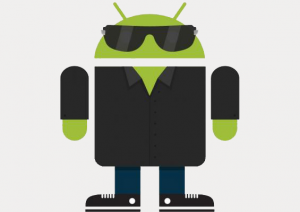
There has been a misconception all around the world that Android lacks sufficient measures of data security, whereas, the fact is that Android as an Operating System is quite secure. The Google’s OS is equipped with multiple layers of security and requires your (user’s) permission to perform almost anything that can lead you to some kind of data leakage. Android is a user friendly Operating System and it actually trusts its users and developers. The Operating System is kind of an open system and it gives the freedom to developers to make big changes in it, these changes may destruct the data security barriers of the Android.
Android Operating System asks you on every step what to install or from where to install that reflects the data security concern, but, the user (you) have the final say. IT experts rate this characteristic of Android as a threat, however, that feature is not the real threat, but, the actual danger to a user’s data is the user himself. Android lets you enjoy the great power and there is always greater responsibility for the great power. Android is not lacking the data security tools, but, the guilty of leaking data is you. So, you need to beware of security lacking and instead of making the security of your Android weak, you should strengthen it with a security app like Folder Lock for Android.

If you just talk about Android, it does quite a reasonable job regarding sharing as little information as possible during procedures and no app can make its way in the depth of your database without your due consent. When an app is going to be installed, it has to pass a number of stages. First, the app that is to be installed needs the user’s help by enabling the installation from an unknown source. After that, it has to get passed from the Google’s “Verify Apps” security feature that checks an APK against its own database. Then it requires a last consent from the user, even after that whenever the Android device will run that app, it will ask or warn the user of the damage that this app can make.
So, the actual reason of mobile malware is not the Operating System, but, the user himself. It does not matter which OS you are using, once you give your OS the permission to let the infectious program to attack you, the security of the OS will not be able to do anything. Before downloading any app, it is recommended to have a glance at its reviews and ratings, although it is a terrible way of measuring any app’s efficiency, but, it can give a rough idea regarding the weird and immoral behavior of the application. Also, pay attention to the messages that pop up during the downloading of the app, do not accept all the condition without reviewing them, and just do not give access to your personal information needlessly. Android security is in your hand, so be smart and keep your data safe.
Does Android Collect User Data?
Yes, Android collects user data. This includes information such as device type, location, user activity, and other data. This data is used to improve the user experience and to provide more personalized services.
Does iOS Collect Data?
Yes, iOS also collects user data. This data is used to improve the user experience and to provide more personalized services. iOS collects data such as device type, location, user activity, and other data.
Different Types Of Data Loss
The different types of data loss are:
1. Physical Data Loss: This is a result of physical damage to the storage device, such as a hard drive crash.
2. Logical Data Loss: This is a result of data corruption due to software issues, such as a virus or a system crash.
3. Human Error Data Loss: This is a result of user mistakes, such as accidentally deleting a file or overwriting a file.
Ways To Stop Losing Data
To prevent data loss, it is important to regularly back up important data and store it in a secure location. Additionally, it is important to keep software and hardware up to date, and to use anti-virus and anti-malware software to protect against malicious attacks. Additionally, users should be trained on proper data handling and storage procedures.
Recover Data From Android
Yes, data can be recovered from an Android device. Depending on the type of data, different tools and techniques can be used to recover data. Common methods include using data recovery software, connecting the device to a computer, and using specialized tools such as JTAG or chip-off techniques.
Definition Of User Data In Android
User data in Android refers to the data stored on the device by the user, such as contacts, messages, photos, videos, documents, and more. It is important to back up this data in case the device is lost, stolen, or damaged.
Causes Of Mobile Data Loss
Mobile data loss can be caused by a variety of factors, including physical damage to the device, software corruption, accidental deletion, and more. In some cases, data can be recovered using data recovery software or specialized tools.
Use of User Data
User data is used to personalize a user’s experience with a device, app, or service. It can be used to provide personalized recommendations, customized content, and targeted advertisements. It can also be used to analyze usage patterns, detect fraud, and improve the overall user experience.
Mobile With Best OS
There is no definitive answer to this question as different operating systems have different advantages and disadvantages. Some popular mobile operating systems include iOS, Android, Windows Phone, and Blackberry. Each of these operating systems has its own strengths and weaknesses, so it is important to consider your own needs and preferences when selecting a mobile OS.
Mobile With Safest OS
Again, there is no definitive answer to this question as different operating systems have different security measures in place. Generally speaking, iOS and Android are considered to be the most secure mobile operating systems, but it is important to keep in mind that security measures are constantly evolving and improving. Additionally, it is important to keep your device up to date with the latest security updates and to use a reputable antivirus software.
Android OS The Best In The World
Android OS is widely regarded as the best mobile operating system because of its open source nature, its large app ecosystem, and its ability to be customized to the user’s needs. Android is also known for its security features, including built-in malware protection, sandboxing, and encryption. Additionally, Android OS is constantly being updated with new features and security patches.
Role Of The Data User
The role of the data user is to ensure that the data they are using is secure and up-to-date. This includes making sure that any data they are using is backed up and stored securely, that they are using secure passwords, and that they are using reputable antivirus software. Additionally, data users should be aware of any potential risks associated with the data they are using and take steps to mitigate those risks.
OS Better Than Android or iOS
There is no definitive answer to this question as it depends on the user’s needs and preferences. Android and iOS both have their advantages and disadvantages, so it is important to consider the user’s individual needs and preferences when deciding which OS is best for them.
Powered by NewSoftwares.net
